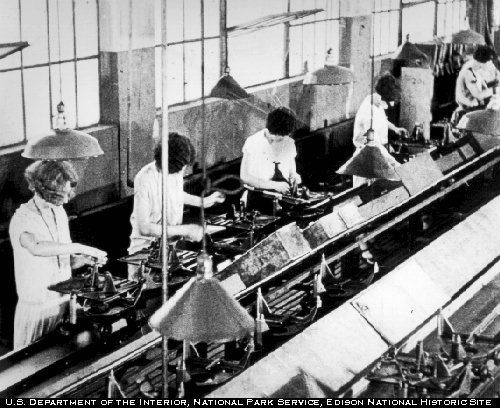Hawthorne effect is called the change that people take when they know they are studied or observed. This Effect has been studied after researcher Henry A. Landsberger conducted a study in 1955. He analyzed some experiments made by Elton Mayo, between 1924 and 1932, at a factory called Hawthorne Works.
Mayo tried to figure out how the changes in lighting were affecting the productivity of workers. At the end of the study, he discovered that lighting did not produce any alterations in the workers’ rents, although there was a minimum of light.
However, there was an increase in productivity in some workers. This factor had nothing to do with light. Simply, those who knew to be studied became more productive. Performance rose automatically whenever workers realized they were under constant observation.
The initial conclusion was that the workers felt special to be chosen as the subject of study. This led them to perform their work more efficiently . Additional factors such as lighting, ventilation and even infrastructure did not cause any major impact. This was called Hawthorne Effect.
Workers’ opinions compared to the Hawthorne Effect
To test the existence of the Hawthorne Effect , scholars interviewed workers. They wanted to investigate directly on them and to understand what factors, in their opinion, had influenced the increase in productivity. What the workers surprise the scholars.
According to the workers, the decisive factor that had pushed them to be more effective was to look for improvement of interpersonal relationships within the factory. Apparently, without realizing it, the scholars had improved the working environment, with the intention that the workers collaborated with the study.
Thanks to these results, a new branch of psychology was created: the industrial one. It was possible to demonstrate that human relationships represent an element that decisively affects productivity. However, the idea was that the change of subjects had occurred because they had been observed.
The Hawthorne Effect Nowadays
After this initial phase of studies, others took it. However, so far, they have proved inconclusive. Nevertheless, the existence of the Hawthorne Effect is accepted as a positive psychological reaction to the feeling of being observed during an experiment. This effect is particularly good when the activity to be performed is not particularly complex, otherwise the “observation effect” might be counterproductive for performance.
Apparently, people create fantasies about what scholars expect from them. They do not feel that it is enough to act normally, as they would do on a daily basis. They think they have to raise their conduct to levels that, theoretically, scholars want to observe. In other words, they adapt their behavior to some beliefs.
This, of course, is not only applicable to experiments carried out in the field of work, but also covers studies on humans in general.
Other aspects of the Hawthorne Effect
The Hawthorne Effect has been considered a particularly problematic factor in medical studies. Some patients, knowing that they were observed, claimed to have noticed an improvement that was not then found with medical evidence. This could be verified by analyzing objective clinical indices. The patient claimed to be better, but clinical trials revealed that no change had occurred.
The Hawthorne Effect, or behavioral improvement, as well as occur in situations where people feel they are observed, is also manifested in the following circumstances:
- When a new situation arises, changing the routine.
- When people feel “located” in artificial situations, for example when they are brought to a lab.
- When you follow the experiment for a certain amount of time and then it is changed.
- When a person thinks he or she is in a situation that may be positive, he or she will increase his / her commitment.
- When there are factors that reduce the feeling of boredom.
Many people look with skepticism about the Hawthorne Effect. It is a concept that follows a study and for which several questions persist. However, this is an interesting psychological phenomenon that could be applied to improve people’s commitment in different situations, especially in simple and repetitive ones, as we have already said.
